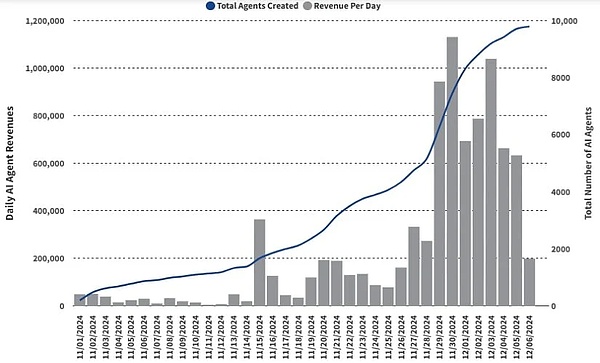
By 2025, the rise of artificial intelligence (AI) agents will redefine the Web3 landscape, with staking and on-chain transactions of Crypto assets becoming major use cases.
According to Cointelegraph, despite challenges such as technical limitations, regulatory obstacles and concerns about centralization, industry experts expect these autonomous systems to have a significant impact on the decentralized community. play a key role.
1AI Agents in Web3: The New FrontierArtificial intelligence agents, also known as agent-based artificial intelligence, can operate autonomously to achieve complex goals. These systems are already making waves in the digital economy, developing decentralized applications, launching tokens, and enabling human-like interactions.
According to a report by asset management firm VanEck, blockchain networks can accommodate more than one million artificial intelligence agents by the end of 2025. Currently, approximately 10,000 AI agents collectively earn millions of dollars each week through on-chain activities.
Matt Hougan, director of research at Bitwise, said: "The potential for artificial intelligence agents to interact with Crypto assets The fields are limitless. This booming market will witness countless experiments, and some breakthrough applications may emerge as frontrunners."
2 Promising Use Cases for Artificial Intelligence AgentsStaking activities of Crypto assets are expected to become one of the earliest and most viable applications of artificial intelligence agents.
Staking involves locking tokens to protect the blockchain network and earn part of the transaction fees. Hougan pointed out that "the participation of artificial intelligence agents in staking seems to be a logical first step."
Projects such as ai16z and Virtuals have begun to leverage AI for innovative applications.
ai16z’s agent Eliza independently manages the on-chain liquidity pool, with annualized returns reportedly exceeding 60%. Likewise, Virtuals provides a platform for deploying AI agents on networks such as Coinbase’s Base.
3 Overcoming ChallengesDespite the bright future, decentralized AI agents still face significant obstacles.
Michael Casey, co-founder of the Decentralized Artificial Intelligence Association, emphasized the risks of centralized systems dominating the field of artificial intelligence and warned: "Without decentralization , an imbalanced system could lead to catastrophic consequences.”
In addition, current decentralized AI models lag behind OpenAI’s ChatGPT in terms of speed and computing power. Isocentralized model.
JD Seraphine, Web3 AI developer at Raiinmaker, explains: “Creating viable decentralized AI agents depends on developing technologies that both ensure high-quality training data and protect Solution to user privacy. ”
At the same time, regulatory pressure is also huge. Casey noted that “major players such as OpenAI are lobbying for rules that favor their centralized models, which could be detrimental to decentralized AI initiatives.”
4 Transformative ImpactAs the Web3 ecosystem grows, the integration of AI agents may lead to unprecedented possibilities.
Investors and developers are keen to explore this emerging field. Hougan succinctly sums up this view: "It's okay not to know what's going to happen, as long as you recognize the importance and prepare for the exposure."
The rapid development of artificial intelligence technology, coupled with the decentralized spirit of Web3, has laid the foundation for an era of change. While challenges remain, the potential of AI agents to reshape the digital economy is undeniable.
By 2025, these autonomous systems may become an integral part of blockchain networks, driving innovation and efficiency throughout the ecosystem.











